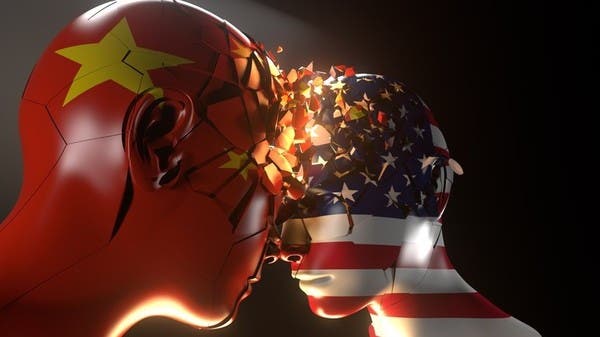An article published in the Financial Times has warned of the potential for a cold trade war between the United States and China due to tariffs imposed by former President Donald Trump, suggesting that such a conflict would not serve American interests.
Stephen Wertheim, a researcher at the Carnegie Endowment for International Peace, noted in the article that the second Trump administration has created significant uncertainty, whether regarding future U.S. tariff rates or the direction of American military alliances.
Wertheim also pointed out that Washington has voluntarily relinquished its global leadership in clean energy to Beijing, a shift that should prompt a reevaluation of the push for comprehensive competition with China, as many U.S. officials envision. Trump’s policies are weakening America’s already fragile ability to contain China’s global influence, similar to how it contained the Soviet Union in the past. Meanwhile, America’s closest allies are reluctant to form an anti-China bloc before Trump takes office again, even as U.S. military power remains attractive to countries directly threatened by China.
If competition between the U.S. and China intensifies, the world could split into two separate economic and technological spheres. Wertheim argues that Washington must exert greater effort to prevent such a division and find ways to coexist with China.
He added that by the end of Trump’s term in 2029, China will play a more critical role in mitigating the worst effects of climate change. While the Biden administration had chosen to invest in domestic renewable energy and expanded U.S. oil and gas production, Trump has dismantled those policies and introduced incentives for fossil fuel production. As a result, the U.S. will remain an oil-dependent nation in the foreseeable future, and environmentally conscious Americans will need to focus innovation on next-generation capabilities, such as geothermal energy, where the U.S. can outperform China’s many advantages.
Last year, the U.S. quadrupled tariffs on Chinese electric vehicles to 100%, effectively banning them from the American market. However, if U.S. automakers fail to produce affordable electric vehicles comparable to China’s BYD models, the country could face a dual crisis involving both consumers and climate concerns.
— news from (العربية)
— News Original —
تحذير من انقسام اقتصادي عالمي بسبب سياسات ترامب تجاه بكين
خلص مقال نشرته جريدة “فايننشال تايمز” إلى التحذير من اندلاع حرب تجارية باردة بين الولايات المتحدة والصين بسبب الرسوم الجمركية التي فرضها الرئيس دونالد ترامب، وقال إن اندلاع مثل هذه الحرب لن يكون في صالح الأميركيين.
وقال الكاتب والباحث في مؤسسة “كارنيغي” للسلام الدولي ستيفن ويرثيم في المقال الذي اطلعت عليه “العربية Business”، إن ولاية ترامب الثانية خلّفت غموضاً كبيراً، سواء تعلق الأمر بمعدلات الرسوم الجمركية الأميركية التي ستُفرض بعد بضعة أشهر، أو ما يُخبئه المستقبل للتحالفات العسكرية الأميركية.
كما لفت إلى أن “هناك أيضاً بعض الحقائق الجديدة والبارزة، أبرزها تنازل واشنطن الطوعي عن الريادة العالمية في مجال الطاقة النظيفة لبكين، وهو ما ينبغي أن يدفع إلى إعادة النظر في السعي نحو منافسة شاملة مع الصين، وهو ما يتصوره الكثير من المسؤولين في واشنطن”.
ويقول ويرثيم إن ترامب يُلحق الضرر بقدرة الولايات المتحدة الهشة أصلاً على احتواء النفوذ العالمي للصين، كما فعلت سابقاً مع الاتحاد السوفيتي، فيما لا يرغب أقرب حلفاء أميركا في تشكيل كتلة مناهضة للصين قبل تولي ترامب منصبه، بينما لا تزال القوة العسكرية الأميركية تُحافظ على جاذبيتها بالنسبة للدول الأكثر عرضة للتهديد الصيني المباشر.
ويرى أنه إذا اشتدت المنافسة بين الولايات المتحدة والصين، فسوف ينقسم العالم إلى مجالين اقتصاديين وتكنولوجيين منفصلين، وهو ما يوجب على واشنطن أن تبذل جهداً أكبر لمنع مثل هذا الانقسام والتعايش مع الصين.
وذكر ويرثيم أنه “بحلول نهاية ولاية ترامب في عام 2029، ستكون الصين أكثر أهمية في منع أسوأ آثار تغيّر المناخ، فيما كانت إدارة بايدن قد اختارت الاستثمار في الطاقة المتجددة المحلية، مع توسع إنتاج النفط والغاز الأميركي، أما الآن فقد قام ترامب بتفكيكها وأضاف حوافز لإنتاج الوقود الأحفوري، ولذلك فسوف تظل الولايات المتحدة دولة نفطية في المستقبل المنظور، وسيتعين على الأميركيين المهتمين بالبيئة تركيز الابتكار على قدرات الجيل التالي، مثل الطاقة الحرارية الأرضية، التي تتفوق على مزايا بكين العديدة”.
وفي العام الماضي، ضاعفت الولايات المتحدة التعريفات الجمركية على السيارات الكهربائية الصينية أربع مرات لتصل إلى 100%، مما أدى إلى حظرها في أميركا من الناحية الفعلية. ومع ذلك، إذا فشلت شركات صناعة السيارات الأميركية في إنتاج سيارات كهربائية بأسعار معقولة تضاهي سيارات BYD الصينية، فسوف تواجه الولايات المتحدة أزمة تتعلق بالمستهلكين وبالمناخ معاً.
